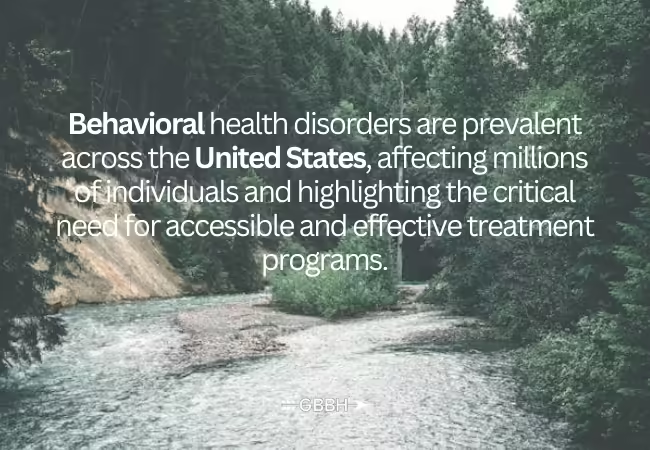Behavioral health is a cornerstone of overall well-being, encompassing mental health, emotional regulation, and the ability to navigate life’s challenges. It addresses how behaviors impact physical and mental health, focusing on conditions such as anxiety, depression, anger management issues, and relationship dynamics. Comprehensive behavioral health care is essential for achieving a balanced, fulfilling life.
At Greater Boston Behavioral Health, we are committed to providing high-quality care to address a variety of behavioral health concerns. From Anger Management Therapy to Anxiety Treatment Programs and Family Therapy Programs, our services are tailored to meet the needs of individuals and families in Boston. This guide delves into the essential aspects of behavioral health and highlights the benefits of accessing behavioral health in Boston.
What Is Behavioral Health?
Behavioral health encompasses the emotional, psychological, and social aspects of well-being, as well as how behaviors influence physical health. It includes mental health care, substance use treatment, and therapy for coping with stress, trauma, and life challenges.
Behavioral Health vs. Mental Health
While often used interchangeably, behavioral health is broader than mental health. Behavioral health includes mental health conditions but also addresses behavioral patterns like substance use, eating habits, and lifestyle choices that impact overall wellness.
Examples of Behavioral Health Concerns:
- Anxiety and depression.
- Anger management and emotional regulation.
- Substance use and addiction.
- Relationship and family issues.
At Greater Boston Behavioral Health, we address these issues holistically, offering a range of Mental Health Treatment Programs to promote well-being.
The Importance of Behavioral Health in Boston
Boston is a bustling city where the fast-paced lifestyle and high expectations can contribute to stress and mental health challenges. Seeking behavioral health in Boston ensures access to top-tier care tailored to the community’s unique needs.
Why Behavioral Health Matters
- Improves Daily Functioning: Behavioral health care helps individuals manage stress, improve focus, and maintain emotional balance.
- Strengthens Relationships: Therapy enhances communication and conflict resolution skills, fostering healthier interactions.
- Reduces Risk of Severe Issues: Early intervention in behavioral health concerns prevents more serious mental health conditions or crises.
By integrating behavioral health care into daily life, individuals can enjoy better relationships, improved productivity, and a higher quality of life.
Key Components of Behavioral Health Care
1. Individual Therapy
Individual therapy provides a confidential setting for exploring thoughts, emotions, and behaviors. It focuses on helping individuals understand themselves and develop strategies for overcoming challenges.
Types of Individual Therapy:
- Cognitive Behavioral Therapy (CBT): Targets negative thought patterns and helps replace them with healthier perspectives.
- Dialectical Behavior Therapy (DBT): Teaches emotional regulation, distress tolerance, and interpersonal effectiveness.
2. Group Therapy
Group therapy fosters connection and understanding by bringing together individuals with similar challenges. It provides a space for shared learning, mutual support, and skill-building.
Benefits of Group Therapy:
- Reduces feelings of isolation.
- Encourages accountability and growth.
- Builds a sense of community.
Our Group Therapy Programs in Boston offer a variety of topics, including anxiety, anger management, and relationship skills.
3. Family Therapy
Family dynamics often play a significant role in behavioral health. Family therapy addresses these dynamics, improving communication and resolving conflicts.
Key Goals of Family Therapy:
- Strengthen family bonds.
- Provide tools for healthy communication.
- Address the impact of behavioral health issues on family relationships.
Specialized Behavioral Health Programs
1. Anger Management Therapy
Uncontrolled anger can strain relationships and harm overall mental health. Anger Management Therapy teaches individuals to identify triggers, manage their emotions, and express themselves constructively.
How It Helps:
- Reduces the frequency and intensity of outbursts.
- Improves interpersonal relationships.
- Enhances emotional awareness and self-control.
2. Anxiety Treatment Program
Anxiety is one of the most common behavioral health challenges, affecting millions of people. Our Anxiety Treatment Program combines therapy and coping strategies to help individuals manage anxiety effectively.
Treatment Approaches:
- Mindfulness-Based Stress Reduction (MBSR): Helps individuals stay present and reduce anxious thoughts.
- CBT for Anxiety: Challenges irrational fears and develops healthier responses.
- Medication Management: Prescribed when necessary to support recovery.
3. Depression Treatment Program
Depression is a pervasive mental health condition that can affect every aspect of life. Our Depression Treatment Program provides a supportive environment to help individuals regain motivation and hope.
Components of Care:
- Individual therapy to explore and address root causes.
- Group therapy for shared experiences and mutual encouragement.
- Lifestyle interventions, such as exercise and dietary guidance, to support recovery.
How Greater Boston Behavioral Health Supports Recovery
Comprehensive Mental Health Treatment Programs
At Greater Boston Behavioral Health, we offer a wide range of services tailored to individual needs. From addressing specific issues like anxiety or anger management to supporting overall wellness, our programs focus on holistic healing.
Expert Care at Our Mental Health Treatment Center in Boston
Our experienced team works closely with clients to develop personalized treatment plans. We combine evidence-based therapies with innovative techniques to ensure effective outcomes.
Community-Centered Approach
We believe in the power of community to support healing. Our programs include opportunities to connect with others through Group Therapy Programs, peer support groups, and family sessions.
Why Choose Behavioral Health in Boston?
Choosing Boston behavioral health services means accessing world-class care in a vibrant, supportive community. Boston is home to some of the most advanced mental health and behavioral health resources, making it an ideal location for individuals seeking help.
Advantages of Seeking Local Care:
- Access to experienced professionals specializing in behavioral health.
- A supportive recovery community that fosters connection and accountability.
- Integration with local wellness resources, such as yoga studios and community centers.
Building a Stronger Community Through Behavioral Health
Behavioral health care benefits not only individuals but also their families and communities. At Greater Boston Behavioral Health, we strive to create a positive impact by fostering understanding, reducing stigma, and promoting mental wellness throughout the Boston area.
Ways to Build a Supportive Network:
- Participate in Group Therapy Programs to connect with peers.
- Engage in family therapy to strengthen bonds and improve communication.
- Take advantage of community resources for ongoing support and growth.
Conclusion
Behavioral health care is essential for achieving balance, improving relationships, and navigating life’s challenges. At Greater Boston Behavioral Health, we provide comprehensive services tailored to each individual’s needs. Whether you’re seeking help for anxiety, anger management, or depression, our compassionate team is here to guide you every step of the way.
Contact our Mental Health Treatment Center in Boston today to learn how we can help you or a loved one achieve better mental health and overall wellness. Call us at (888)278-0716 today to learn more about our services and how we can help you on your journey to recovery!
FAQ on Behavioral Health
How does behavioral health differ from mental health?
While mental health focuses on psychological conditions, behavioral health is broader, addressing behaviors and lifestyle choices that affect mental, emotional, and physical health.
What types of therapy are included in behavioral health care?
Behavioral health care includes individual therapy (CBT, DBT), group therapy, family therapy, and specialized programs like anger management, anxiety treatment, and depression treatment.
How does Greater Boston Behavioral Health support clients?
We provide personalized care through Mental Health Treatment Programs, Family Therapy Programs, and Group Therapy Programs, ensuring holistic support for each client’s needs.
Why is routine care important for behavioral health in Boston?
Routine care helps manage stress, build emotional resilience, and foster healthier relationships, especially in a fast-paced environment like Boston.


